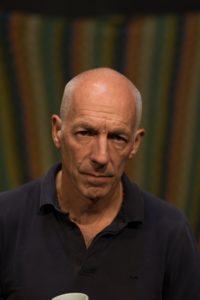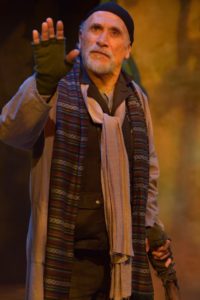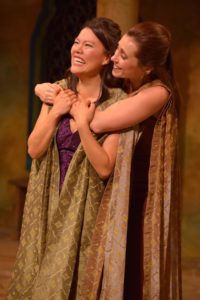Q&A with Rob Clare by Dan Berkowitz
So my adventurous life continues apace. A little over two weeks ago, I had heart surgery. Yes: despite opinions to the contrary, I do have a heart. And it was operated on.
I don’t particularly recommend heart surgery, unless you really need it, which apparently I did. I especially don’t recommend it when the surgeon begins the operation before the sedation has taken effect, and also before the shot numbing you has taken effect: I felt everything, and told the people in the operating room that – loudly, but to little avail. Fortunately, I eventually passed out from the pain.
Sooooo… I’m taking it a bit easy for the moment. And doing a Q&A is a pretty easy thing, so here we go with one.
Rob Clare, born and trained in the UK, is an internationally recognized Shakespeare specialist, who has worked in Ireland, Austria, Germany, Australia, the US, and even in India, where he directed productions of A Midsummer Night’s Dream, Julius Caesar, and Romeo and Juliet. He has worked as a freelance verse and text coach with the Royal Shakespeare Company, and has taught in the US at The Juilliard School, Yale, Brown, NYU Tisch, USC, and CSU Long Beach. His production of As You Like It is playing at Antaeus Theatre Company through September 10.

Rob Clare. Photo: Facet Photography
Dan Berkowitz: In thirty seconds, can you tell us what As You Like It is about?
Rob Clare: Love, life, sibling rivalry, and how best to make love to shepherdesses. And goatherds.
DB: Sounds good to me. Whereabouts in Shakespeare’s canon is the play – is it one of his youthful works, or did he write it after many years in the theatre? And how does it compare with his other comedies?
RC: It was written about half way through his career, when he was reaching the peak of his powers. It’s at once funny and joyous, but also more mature and more complex than some of the earlier comedies. The beginning is arguably quite dark, before we emerge into the sunlit comedic uplands of the play’s latter stages.
Abigail Marks (L) and Julia Davis. Photo: Daniel G. Lam Photography
DB: Someone once said Shakespeare didn’t write in English, he wrote in Elizabethan: how do you make an audience in 2017 understand phrases such as “bearded like the pard” – or does it matter?
RC: It’s wrong to assume that audiences in Shakespeare’s day had bigger vocabularies than we do, now – in fact, a large percentage were illiterate. So the extraordinary language of these plays was as fresh and challenging to most of them as it can be to modern day audiences. He was ahead of his own time. And in many ways, we’re all still catching up with this writer genius, rather than having left him and his works behind. And while it may sometimes be hard to follow what’s being said on the page, it’s not hard when you’re in the theatre – where you realize, very quickly, that meaning and intention are completely clear, as you watch the characters in action. You don’t need to be able to translate every phrase, to follow and enjoy what’s happening between them. So when I invite friends etc. to come to see a production, if they don’t already know the play, I ask them please not to read it beforehand. There’s no need, and it can spoil the surprises of the unfolding plot. Come and see for yourselves!

Tony Amendola. Photo: Daniel G. Lam Photography
DB: And speaking of understanding, you directed Hindi productions of several Shakespeare plays in India. Do you speak and understand Hindi, and if not, how did you communicate with the actors? How does Shakespeare “translate” into such a different language – and culture?
RC: See the answer directly above. No, I do not speak or understand Hindi. But that did not stop me being able to direct the play – which is not just what is spoken, but what is actually happening, between the characters. The language is only a part of that, albeit an important one. So I communicated through an assistant, who was also a translator, as and when required. And d’you know what? It went very well…! The great thing about Shakespeare’s plays is that their resonance is universal, not confined to any one culture or framework of reference. Wherever human beings interact with one another, with passion, commitment and intelligence, Shakespeare’s plays will engage us and will be understood.
James Sutorius. Photo: Daniel G. Lam Photography
DB: How did you get involved with the Antaeus company, and what about its policy of “partner-casting,” which means there are two different casts for every show? What’s it like to rehearse two complete casts at the same time?
RC: I knew some actors in the company, who recommended me and my work to the Artistic Directors, who then interviewed me and invited me to direct the show. I was delighted to accept, partly because I was intrigued by the partner-casting aspect. And while it does bring some special challenges (especially in technical rehearsals), I love it. There is no one way to interpret any Shakespeare character, and having two actors simultaneously working on each role certainly reinforces this. They each bring their own individual truth, and nuances, to the role. In fact, everyone in the audience could happily come to see the production twice!

Desiree Mee Jung (L) and Sally Hughes. Photo: Daniel G. Lam Photography
DB: You’ve worked in theatres all over the world. How does working in Los Angeles theatre compare with working in other “world theatre capitals”? Do you have a favorite city? Why?
RC: LA is great because it has such a concentration of high quality actors, many of whom are primarily involved in TV and film work, but wish also to stretch and exercise their stage muscles in projects such as this. It’s a privilege to work here, and with them. But my favourite city, to work in, from my own experience? Well, if I had to choose, it would probably be Delhi, which I do miss. But that’s as much for the food, and for the experience of being in India in general, as for the work itself!
DB: What’s a fun thing about you that no one else knows? (And we guarantee not to tell…)
RC: I always wanted to be the baddie in a Bollywood movie. And yes, that’s Bollywood, not Hollywood…
As You Like It
Written by William Shakespeare
Directed by Rob Clare
Through September 10
Antaeus Theatre Company
Kiki & David Gindler Performing Arts Center
110 East Broadway
Glendale, CA 91205
(between N. Brand Blvd. and Maryland Ave.)
Tickets: 818-506-1983 or www.Antaeus.org

